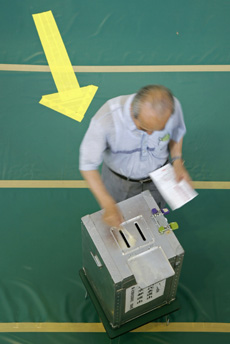Japan starts parliamentary election vote
(Reuters)Updated: 2007-07-29 10:10
Japan's conservative ruling camp braced for an expected election defeat on Sunday that could put pressure on hawkish Prime Minister Shinzo Abe to resign and usher in a period of policy paralysis and political confusion.
Polling stations across Japan opened at 7 a.m. (2200 GMT) on a cloudy morning.
 A man casts his vote for a Japanese upper house election into a ballot box at a polling station in Tokyo July 29, 2007.[Reuters]  |
"I've always voted for the LDP, but this time I voted for the Democratic Party," said Toshio Muto, 75, a craftsman in Tokyo's Setagaya ward.
"I've seen the LDP pass a lot of legislation by force. I don't want this. I want change," he added.
The LDP and its junior partner, the Buddhist-backed New Komeito, need to win 64 seats to keep their majority in the upper house. The New Komeito is aiming for 13 seats.
Abe's coalition will not be ousted from government if it loses in the upper house, since it has a huge majority in the more powerful lower chamber, which elects the premier.
But laws will be hard to enact, threatening policy deadlock.
Abe's allies have said he need not step down even if the coalition loses and many analysts agree he might be able to hang on temporarily -- especially if the LDP wins at least 40 seats -- partly because of the lack of a convincing successor.
A weakened ruling bloc is expected to try to bolster its hand by wooing independents, members of a small party, and conservatives in the Democratic Party, whose membership is drawn from across the political spectrum.
Still, pressure for Abe to resign is expected to grow if the coalition suffers a crushing defeat.
Despite tough talk toward China before taking office, Abe won early praise for improving ties with Beijing and Seoul, chilled during the five-year reign of his predecessor, Junichiro Koizumi.
But doubts about his leadership abilities were fanned by a series of gaffes and scandals that led two cabinet members to resign and one to commit suicide, as well as revelations that the government had lost track of millions of premium payments.
NO KOIZUMI
Only two years ago, Koizumi led the LDP to a huge victory in a lower house election that the charismatic maverick made a referendum on his pet project of privatising the postal system.
The soft-spoken Abe, analysts say, was always at risk of suffering by comparison with the sound-bite savvy Koizumi.
Critics also say Abe, whose top priorities are revising the constitution and reforming education to nurture patriotism, was out of touch with voters' worries about bread-and-butter issues such as the economy, pensions and health care.
Hoping to woo those hit by Koizumi's market-friendly reforms, opposition Democratic Party leader Ichiro Ozawa -- a pugnacious veteran who bolted from the LDP 14 years ago -- has pledged to shrink income gaps and ensure the weak are not neglected.
Ozawa, 65, has said he will step down as party leader and not run for parliament again if the opposition fails to win this time.
Yamada Yukari, a 32-year-old housewife, leaving a Tokyo polling station with her husband and small child, said she was angry about the pensions mess, but had nonetheless decided to vote for the LDP.
"Until yesterday I was going to vote for the Democrats, but when I saw various opinions on television, I began to think they were all the same anyway," she said. "So I voted for the LDP because I think they are more powerful."
Some analysts and politicians say a deadlock could spark an early election for the lower house, but with a massive majority in the chamber, the ruling camp would be wary of taking that risk. No general election need be held until 2009.
|
|
|
||
|
||
|
|